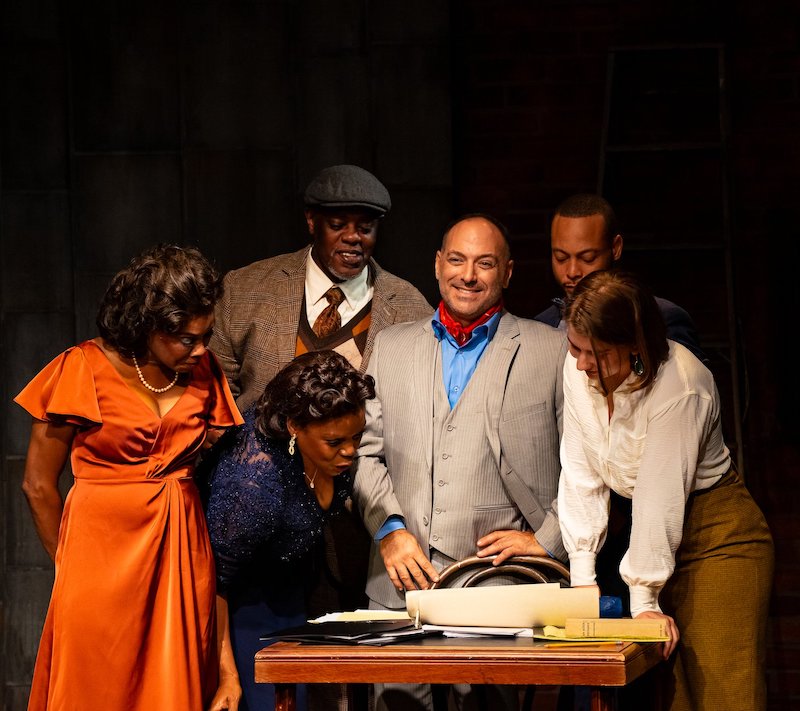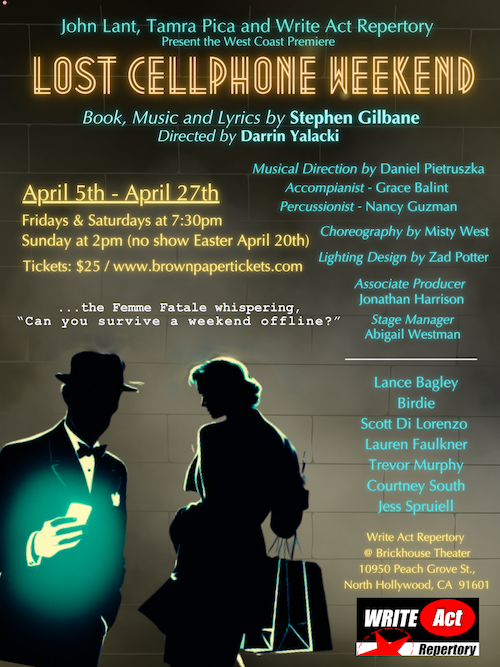
Reviewed by Steven Leigh Morris
Actors Co-op
Thru Nov. 10
RECOMMENDED
Kimi Walker, Lorinda Hawkins Smith, Rodrick Jean-Charles, Spencer Rowe, Freedom, Sophia Kalugin (Photo by Kamal Bolden)
How does a play grapple with contemporary racial politics without boiling-to-death in what’s become a calcified stew of current passions? First, as playwright Alice Childress does in Trouble in Mind, set it in 1957, then have a collective of mixed-race characters rehearse a “colored” Broadway show. In one blazing streak, historical context has been added to the discussion — not just added, but the history is the very frame of the discussion. Within that frame, any number of pertinent dynamics unfold — those who rebel and those who placate. No group here, White or Black, is monolithic. There are Black characters who cow-tow (Rodrick Jean-Charles) and a White yet green Yale Drama School recent graduate (Sophia Kalugin) who speaks her mind. All seek opportunity in variegated ways. That’s a large part of the grounding for where we are today, and why, as the saying goes, the more things stay the same, the more they stay the same.
This would all make it appear that Childress wrote a retrospective play in order to deal the post-George Floyd era, but that’s not the case. In fact Trouble in Mind first appeared off-Broadway in 1955. It was of its own time. That it speaks so clearly to ours is a credit to its underlying wisdom and humanity that critiques underlying patterns within a society while remaining empathetic to all of the players. (For the record, the play made its London debut at the Tricycle Theatre in 1992 before opening on Broadway in 2021.)
White director Al Manners (Spencer Rowe, in top form as a blustering, blistering no-nonsense leader) is taking a risk for his Broadway debut in staging a “colored” play, written by a White playwright that Black actress and former star Wiletta Mayer (Kimi Walker, also a first tier performance) believes is crap, though she’s reluctant to tell anybody that. She has spent her career placating her employers (White, of course) and, like her cast-mate, Millie (Lorinda Hawkins Smith), playing characters who croon “Lord have mercy!” all night long, and other Raisin in the Sun tropes that George C. Wolfe satirized in his The Colored Museum. Wiletta and Millie have done all this to get ahead. But now Wiletta finds herself behind, yet with this production opportunity to jump-start a flagging career. To smile and to laugh, she believes or, by play’s end, believed, are the keys to the kingdom.
The “trouble in mind” emerges in a scene near play’s end involving a lynching, wherein her character, a mother, persuades her innocent son to confess to a crime he didn’t commit and to “give himself up” — to a lynch mob! For perhaps the first time in her career, she speaks out against the veracity of a play she’s performing in. Why would a mother do that? Director Manners tries to persuade her that it’s a moment of Christ-like sacrifice, that this a tragic, theological moment, for which audiences will weep.
But Christ wasn’t dragged away against his will, she counters. It’s a sacrifice he chose, for his purposes. As Manners persists, she calls him a racist. He reels before offering a verbal reply to White privilege, that every tier in society has its stresses and strains. I wasn’t entirely persuaded by this: the stresses of poverty and exclusion are of a different order from the stresses of working for a corporation, but Childress’s efforts to crawl inside his soul with impulses of generosity are striking.
It all comes down to the producers’ final argument in this trial-posing-as-a-rehearsal: “The American public is not ready to see you the way you want to be seen.”
This is something to ponder, from 1955. Now seven decades later, the nation considers for the first time in its history, electing a Black female to be its president. Is the American public, at long last, ready to see Kamala Harris the way she wants to be seen? And even if it does, will the lynch mob prevail regardless? How deep run these veins of bigotry?
Kimberly Hébert Gregory stages a solid and compelling production with her excellent ensemble that also features Larry Eisenberg, Freedom, John Marzilli, and Brendon Shannon.
Joel Daavid’s theater-backstage set is strikingly effective with its counter-weight ropes of yore, though, for a such a realistic play, there is the question of whether this play would be having first read-throughs and early rehearsals in the actual theater, rather than in the kind of leased rehearsal halls that have always been a mainstay of Broadway productions. (The theatre-stage locale, however, is specified in the script.)
Particularly touching is Wiletta’s bond with Henry (Eisenberg), a doddering 78-year-old Irish doorman, formerly an electrician, who’s been around this theater his whole life yet is disparaged as an old and useless go-fer by Mr. Manners. It’s the Irish rebel spirit that Wiletta finds so endearing, a White guy who is sinking into his grave and yet possesses not a trace of resentment — just the conviction that you’ve got to treat people right.
Actors Co-op David Schall Theatre, 1760 N. Gower St., Hollywood. Fri – Sat. 7:30pm, Sun. 2:30 pm. Added Sat. Matinees: Oct. 12 & Oct. 19; thru Nov. 10. actorscoopboxoffice@gmail.com. Running time, two hours and 10 minutes, including intermission












